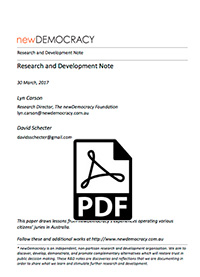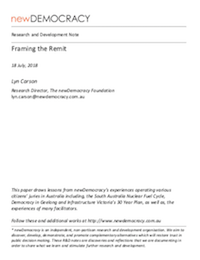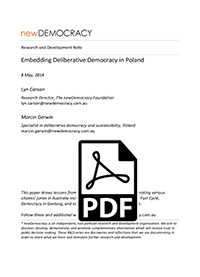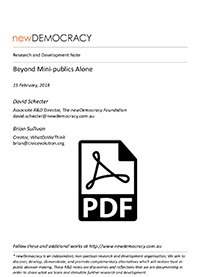Lyn Carson – Research Director, The newDemocracy Foundation
What is the question?
How can participants in mini-publics critically and effectively, hear and learn from expert witnesses in a way that ensures they understand the challenges being considered?
NB: This R&D Note is focused on human experts in the decision-making space and not on published or online material which has its own set of challenges.
What are the usual answers?
Experts may be self-defined or may have obtained relevant credentials. They claim to know or do know a great deal about their specific area of expertise. These experts could be scientists, academics, government employees, special interest groups, community activists, and more. For many of them, the ‘banking model’ of learning persists: that learners are empty vessels into which knowledge can be deposited and later withdrawn (Freire, 1976). Experts need only provide a persuasive presentation or a fact-based lecture and their job is done.
What are the problems with the usual answers?
It is possible that a charismatic ‘expert’ can offer a slick, substance-free presentation, manipulate facts, and be immensely convincing. In contrast, those assured of the robustness of their evidence can be quite unconvincing because they believe that people are empty vessels into which these facts can be ‘deposited’. Adults do not learn in this way (see Freire, 1976, 1993).
A randomly-selected group will have diverse participants: some who are knowledgeable, some who are quite ignorant, and many in between. They will be tremendously curious because they are conscientious about giving due consideration to the challenge at hand. That’s their starting point – curiosity (Landemore, 2012). Once their burning questions are answered, they will want to dig deeper and will have many more unanswered questions. A process needs to be created which enables these questions to be tackled. There is no point in inviting an expert to offer a lengthy presentation when participants want specific answers to specific questions.
newDemocracy’s approach to learning is contrary to the banking model of learning that remains too-prevalent in educational institutions (Bartholomae & Petrosky, 2008). This is because the wisdom that can be created by a diverse group is often under-estimated and under-valued. newDemocracy contends that a learner-centred approach is more efficacious (Knowles et al, 2012). newDemocracy focuses on critical thinking and questioning that emanates from citizens’ natural curiosity when they become collectively motivated to solve a problem.
What alternative answer/s might solve the problems?
newDemocracy has undertaken considerable experimentation into the interaction between mini-public participants and experts, as well as the learning derived from those interactions.
Experts can be so immersed in their own area of expertise that they lose the capacity to communicate effectively with everyday citizens. It is important to make that clear to a visiting expert and to encourage them to use language that is not saturated in academic jargon, acronyms, or similar. Helpful guidelines are provided to experts beforehand.
The role of the expert is to ensure that everyday – randomly-selected citizens – are fully informed prior to their deliberations. newDemocracy insists that, once participants have absorbed introductory information provided by both the decision maker and nominated speakers, participants then choose the experts they wish to hear from.
What is the most effective way to extract useful information from experts?
Citizens will have been briefed about their different learning styles and the importance of critical thinking for the interrogation of expert knowledge [See, Critical Thinking]. Depending on the size of the group, the questioning of experts can vary; however, since small group work is used even in large juries, this variation is minimal.
Consider the application of the following method to a small (Eurobodalla, NSW), medium (Geelong, Victoria) and large mini-public (South Australian Nuclear Waste). The jury is divided into groups of six (to match the six different approaches to critical thinking). The room is divided into circles of chairs – seven to each circle – one chair in each circle is empty. There are seven groups in each room (with larger juries, many rooms are used).
The session may have started with an expert panel, with each person offering a very brief explanation of his/her knowledge and experience – in other words, what information they consider themselves qualified to comment upon. This may be covered in written materials or be addressed in a plenary session.
These experts then enter a room with forty-two participants (7 x 6), and each of the six experts occupies one of the empty chairs, with one group without an expert. This pause group’s task is to discuss the questions that are going to be asked or have already been asked depending on the time that the group pauses.
A period of 10-15 minutes is allocated to each round. The expert is expected to answer questions during each round, with questions that are initiated by the participants, then they move to the next circle. It’s not a time for declaratory speeches, it’s a time to satisfy each group’s curiosity. Experts are often exhausted by this process because the questions are very exploratory and often challenging.
After the groups have completed their questioning there will typically be a period for gathering facts that jurors require checking or information gaps that need to be addressed. These outstanding questions are placed on boards around the room and are answered over the course of the mini public [See, Deliberation].
References:
Bartholomae, D & Petrosky, A (2008) Ways of Reading. 8th ed. Bartholomae, David and Anthony Petrosky. Boston: Bedford- St. Martin’s. 242-254.
Freire, P (1976) Education: The Practice of Freedom, London, Writers and Readers Publishing Cooperative
Freire, P (1993) Pedagogy of the City, Bloomsbury Publishing
Knowles, M, Holton, E F & Swanson, R A (2012) The Adult Learner: The Definitive Classic in Adult Education and Human Resource Development, 7th ed. Routledge
Landemore, H (2012) “Why the Many are Smarter than the Few and Why It Matters”, Journal of Public Deliberation, Vol. 8, Issue 1, Article 7. Accessed 28 March 2017
* newDemocracy is an independent, non-partisan research and development organisation. We aim to discover, develop, demonstrate, and promote complementary alternatives which will restore trust in public decision making. These R&D notes are discoveries and reflections that we are documenting in order to share what we learn and stimulate further research and development.




